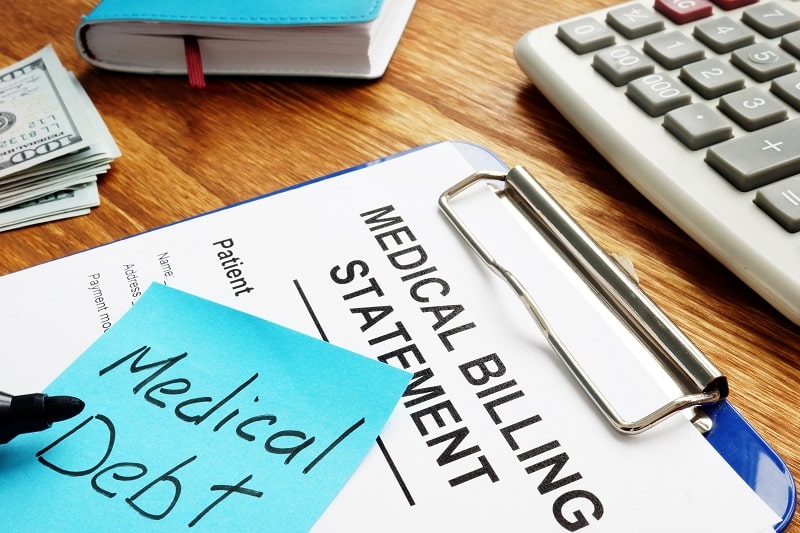Unlike most consumer debt, medical debt is often unavoidable, unplanned, and despite insurance, can be excessively high. When medical debt is unpaid, those accounts can be turned over to collections, damaging your credit and can even result in a lawsuit for unpaid funds which can put your paycheck, your home, and your personal property at risk. While that high balance can be understandably intimidating, it does not have to be unmanageable. You have options when it comes to tackling medical debt. Here are a few tips to help you manage large medical bills.
1. Understand your bills
Medical bills can be convoluted. There are often several charges associated with each doctor visit or procedure, and there may even be multiple bills associated with the same service from different providers. For instance, you may get a bill from your doctor for the visit, a bill from the lab that completed the ultrasound or blood draw, and a bill from the radiologist who analyzed the tests. When you factor in any insurance payments that were applied, it can be very confusing to understand what you are being charged, what was covered by insurance, and ensure that the process is free of any billing or accounting errors.
Therefore, spend some time carefully reviewing your bills. Gather the bills you have received with the same date of service and compare the charges. It is important to make sure that you are not being charged twice for the same service or overcharged due to a billing error. Make sure that each service you are charged for was actually performed. If there is an expense that is not covered by insurance, make sure it was coded and billed correctly, then contact your insurance provider to confirm. When in doubt, contact your medical provider’s billing services representative for clarification of any questions you may have.
2. Bills are negotiable
This may sound like a crazy option, but it is possible to negotiate the costs of your medical treatment. While it is best to discuss medical costs before authorizing treatment, you can also ask your medical provider to adjust your bill after the service. If you do not have insurance or if your insurance provider denies coverage for a procedure that was deemed medically necessary by your medical provider, you can ask your doctor to bill you at a lower rate to mimic what your cost would have been if insurance or Medicare had covered it.
If you are concerned about the accuracy of your bills or if you have very high medical debt, you may want to hire a professional to review your bills for errors. A medical bill advocate can identify any billing or coding errors that may lead to erroneous charges or denied insurance claims and they can negotiate your medical debt on your behalf, sparing you from the time, effort, and frustration of having to figure it out.
3. There are resources to help you pay medical debt
Despite insurance, modern medicine is expensive especially for those battling long-term or terminal conditions. There are many resources available to help cover costly prescriptions, medical procedures, and other expenses. Some hospitals and medical providers offer income-driven hardship payment options for low-income patients. These programs may even offer partial debt forgiveness based on your hardship.
There are also charity care programs and local organizations that help individuals with high medical debt. Reach out to local churches or other community non-profits to learn more about the programs available in your area. You can learn more about available resources and find a credit counselor here.
4. Set up an affordable payment plan
Your medical provider does not want to turn you over to collections and they certainly do not want to sue you for unpaid medical debt. If you are having a difficult time managing your medical debt, reach out to your provider. Most hospitals and doctor’s offices are happy to work out a payment plan that you can afford to help you manage your financial obligations. This ensures they get paid, eventually, without having to incur a greater expense and effort to track you down and collect. Medical debt does not affect your credit score so long as your account is in good standing and does not get turned over to collections. Therefore, even if you only pay ten dollars per month toward your debt, you will not have to worry about your credit taking a hit as long as you stay on top of your payments.
5. Use a credit card to pay it off
Generally, using a credit card to pay off debt is a risky move as it is typically a “robbing Peter to pay Paul” scenario. However, using a zero-percent interest credit card to help cover medical costs is one alternative to being in debt to the hospital or if you want to consolidate multiple medical debts into one monthly payment, such as the doctor’s office, lab, and radiologist example above. Some medical providers offer a credit card for specific procedures or services performed in their offices. This can be a good option if you are unable to pay the bill in full, if your provider does not accept payment plans, and if you can pay off the debt before interest begins accruing. However, anytime you open a new credit card, it can change your debt-to-income ratio which can affect your credit, so this is something to be mindful of.
The most important thing to remember about medical debt is that while it is important not to ignore these bills, they are not as important to prioritize as your other financial obligations. Ask for help to manage these payments and pay what you can afford to keep your account from being turned over the collections. While medical debt can be large, it can also be manageable.


